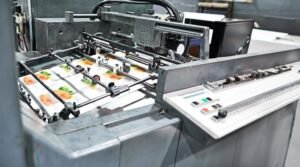In recent years, Artificial Intelligence (AI) has emerged as a transformative force in numerous industries, and manufacturing is no exception. AI, defined as the capability of a machine to imitate intelligent human behavior, has made significant strides from its early days of basic automation. Today, it drives innovations that are reshaping manufacturing processes, enhancing efficiency, and reducing costs. This blog delves into how AI is revolutionizing the manufacturing industry, exploring its applications, benefits, challenges, and future potential.
Read also – Physiotherapy in Rehabilitation After Surgery
The Evolution of AI in Manufacturing
A) Early Adoption and Initial Applications
Manufacturing was one of the first sectors to embrace automation, with early AI applications focusing on simple, repetitive tasks. Initially, AI was used in robotics to handle repetitive operations, such as assembling components and handling materials. These early applications laid the foundation for more advanced uses of AI, demonstrating its potential to enhance productivity.
B) Technological Advancements
As technology advanced, so did AI’s capabilities. The introduction of deep learning and neural networks brought about significant improvements in AI’s ability to process complex data. Combined with the Internet of Things (IoT) and big data analytics, AI began to offer more sophisticated solutions. These advancements have enabled AI to provide deeper insights and more precise control over manufacturing processes.
Key Applications of AI in Manufacturing
1) Predictive Maintenance
Predictive maintenance is one of the most impactful applications of AI in manufacturing. AI systems analyze data from sensors embedded in machinery to predict potential failures before they occur. By assessing historical performance data and detecting anomalies, AI Development Services can forecast maintenance needs, thus preventing unexpected downtimes. For instance, General Electric (GE) has successfully implemented AI-driven predictive maintenance, significantly reducing equipment failures and maintenance costs.
2) Quality Control and Defect Detection
AI has revolutionized quality control through advanced visual inspection systems. Traditional manual inspections are often time-consuming and prone to human error. AI-powered systems, using computer vision and machine learning, can detect defects with higher accuracy and speed. Companies like Siemens have adopted AI for real-time defect detection, resulting in improved product quality and reduced rework.
3) Supply Chain Optimization
AI enhances supply chain management by providing accurate demand forecasting and optimizing inventory levels. Machine learning algorithms analyze historical data and market trends to predict future demand, helping manufacturers align production schedules with market needs. For example, Walmart utilizes AI for inventory management, leading to more efficient supply chains and reduced stockouts.
5) Production Efficiency and Process Automation
AI-driven robotics and smart manufacturing systems are transforming production efficiency. AI algorithms optimize production schedules and workflows, enabling manufacturers to achieve higher throughput with lower costs. Companies such as Tesla have integrated AI into their production lines, automating complex tasks and improving overall production efficiency.
6) Product Design and Development
AI also plays a crucial role in accelerating product design and development. Through simulations and advanced modeling, AI can predict how new designs will perform, reducing the need for physical prototypes. This capability not only speeds up the design process but also fosters innovation. For example, Autodesk’s generative design software uses AI to create optimized designs based on various constraints, leading to novel product solutions.
Benefits of AI in Manufacturing
1) Increased Efficiency and Productivity
AI contributes to manufacturing efficiency by automating routine tasks, optimizing production schedules, and improving process accuracy. This leads to faster production cycles and higher overall productivity. Manufacturers can produce more with less time and resources, giving them a competitive edge in the market.
2) Cost Reduction
The implementation of AI in manufacturing results in significant cost savings. Predictive maintenance reduces unexpected downtime and repair costs, while AI-driven process optimization minimizes waste and rework. By improving resource allocation, manufacturers can lower operational expenses and enhance profitability.
3) Improved Safety and Working Conditions
AI enhances workplace safety by identifying potential hazards and automating dangerous tasks. AI systems can monitor environments for safety compliance and alert workers to potential risks. This reduces the likelihood of accidents and improves working conditions, contributing to a safer and more productive work environment.
Challenges and Considerations
A) Implementation Costs and ROI
While AI offers substantial benefits, the initial investment can be significant. Implementing AI solutions involves costs related to technology acquisition, integration, and training. Manufacturers must conduct a thorough cost-benefit analysis to ensure a favorable return on investment. Case studies, such as those from Bosch, highlight the long-term gains that can outweigh the initial costs.
B) Skill Gaps and Workforce Impact
The adoption of AI introduces a need for new skills within the workforce. Workers must be trained to manage and maintain AI systems, and there may be concerns about job displacement. Upskilling and reskilling initiatives are essential to address these challenges and ensure that the workforce can adapt to new technological demands.
C) Data Privacy and Security
AI systems rely on vast amounts of data, raising concerns about data privacy and security. Manufacturers must implement robust measures to protect sensitive information and comply with data protection regulations. Ensuring data integrity and confidentiality is crucial for maintaining trust and compliance.
D) Integration with Existing Systems
Integrating AI with existing manufacturing systems can pose challenges. Compatibility issues and the need for system upgrades can complicate the implementation process. Manufacturers should develop strategic plans for seamless integration to maximize the benefits of AI technology.
The Future of AI in Manufacturing
1) Emerging Trends and Technologies
The future of AI in manufacturing looks promising, with emerging trends such as edge computing and 5G technology expected to enhance AI capabilities. These advancements will enable real-time data processing and more sophisticated AI applications, further revolutionizing manufacturing processes.
2) Long-term Implications for the Industry
AI is poised to drive significant changes in the manufacturing industry. It will influence the evolution of manufacturing processes, business models, and innovations. As AI continues to advance, it will play a crucial role in shaping the future of manufacturing, offering new opportunities and challenges.
Conclusion
AI is undeniably revolutionizing the manufacturing industry, offering transformative benefits such as increased efficiency, cost reduction, and improved safety. While challenges such as implementation costs and skill gaps remain, the potential rewards make AI a crucial component of modern manufacturing. Manufacturers should embrace AI technologies and explore innovative solutions to stay competitive in an evolving industry.






More Stories
How to Resolve QuickBooks Error 103
How to Resolve QuickBooks Error 102
Impact of Search Google on User Experience